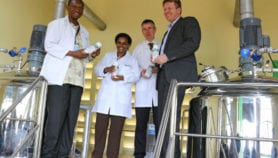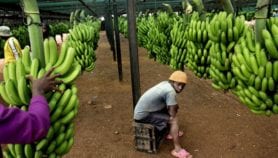Send to a friend
The details you provide on this page will not be used to send unsolicited email, and will not be sold to a 3rd party. See privacy policy.
Although GM crops are controversial, they can still play an important role in meeting the world’s food needs. But the controversies do highlight the need for a robust regulatory framework.
There are several reasons why many poorer communities in the developing world feel justified in regarding modern science and technology with suspicion, if not scepticism.
Some of the reasons are based on practical experience. One example is the fact that the fruits of science often fail to reach the poorest levels of society. Think of the lack of even basic drugs in many parts of Africa, and the widespread problems of disease that result.
Another example is that it is often the poorest communities that suffer most from the side-effects of technology-based growth. Think of farmers falling ill or dying after exposure to chemical pesticides. Or the way that poor urban and rural communities in parts of the developing world are most vulnerable to the impacts of climate change, itself largely the result of the West’s industrialisation.
Put these factors together, and the result is that, for all its promises, modern science often generates a sense of alienation, rooted in feelings of a loss of control. In principle, we can all subscribe to the idea that, as the philosopher Francis Bacon said, "knowledge is power". In practice, scientific knowledge is frequently seen as reinforcing the power of those who already have it — and, as a consequence, further disenfranchising those who do not.
Opposition to GM crops
Nowhere does this alienation appear more strongly than in the public opposition to genetically modified (GM) crops. Critics frequently label this opposition as ‘irrational’ or ‘anti-scientific’.
Such thinking is reflected in yesterday’s verdict by the World Trade Organisation, which overturned European opposition to imports of GM crops from Argentina, Canada and the United States on the grounds that Europe lacked a sufficient scientific justification fior taking such action (see WTO says Europe’s GM ban broke trade rules).
To some extent, the critics are justified. The ‘science’ that opponents of GM crops quote to support their cause is often misleading, incomplete, or just wrong. Think of the mileage given to the work by immunologist Árpád Pusztai, whose claim that eating GM potatoes can weaken the immune system is contested by most experts in the field, but remains widely quoted by GM opponents.
Or look at the claim that GM food can trigger allergies. The evidence is no stronger than data supporting claims that carbon dioxide emissions do not accelerate global warming. Yet those who readily reject the second claim often have little difficulty in accepting the first.
All this, however, misses the point that the opposition to GM crops is not grounded in a scientific assessment of their relative risks and benefits. Rather, it is strengthened by deeper feelings of mistrust and alienation, and the fact that GM technology meets many of the criteria for triggering such a reaction.
The roots of alienation
To start with, intervening directly with the genetic make-up of plants (and animals) is widely seen as a form of interference not only with natural processes, but also with traditional farming practices developed around these processes over centuries.
The crop science industry may claim that biotechnology has been with us ever since humans learnt how to ferment alcohol. But the industry also knows that when the techniques for manipulating genes were invented in the early 1970s, they represented a technological watershed that has transformed the sector.
Second, the international patent system, which controls access to intellectual property, inevitably means that those who seek to use GM technologies can only do so if they are prepared to give up some control of the practices involved (or are prepared to risk using them illegally).
This is the main criticism of the ‘terminator technology’ — crops engineered to produce sterile seeds. Farmers using such seeds must buy new ones every year, usually from multinational companies. This means they cannot follow the traditional practice of saving seed from one year to use in the next.
Third, people’s sense of alienation can grow when foreign researchers take genetic resources overseas to be studied — with the potential for multinational pharmaceutical and chemical companies to make profits by incorporating the active ingredients into new products.
Opponents of this practice have successfully labelled it ‘biopiracy’. The word encapsulates the feeling that native communities have been deprived of valuable possessions, often without permission, and with little or nothing in return (see African ‘biopiracy’ debate heats up).
Confusing science and politics
The problem with all of these arguments is that, despite raising legitimate concerns about how the modern technology is controlled, they can demonise the technology itself. And in doing so they also implicate the science on which it is based.
Sometimes linking the means with their ends is justified. The US National Rifle Association may claim that it is people — not guns — that kill, but that does not imply that guns are a neutral technology (significantly the US patent system refuses to offer protection to clearly anti-social devices, such as letter bombs).
For GM crops, however, this is far from being the case. The technology may have associated dangers that remain unknown, such as the long-term ecological impacts of growing GM crops.
But it is also clear that, provided the technology’s use is properly monitored and controlled, it has the potential to meet the needs of farmers — both large-scale and small — as well as society’s demands for cost-effective food production.
No-one is pretending the dangers do not exist, any more than they do with other modern technologies (such as driving cars or using contraceptive pills). Nor is this to argue against using caution wherever possible, particularly when some of the processes involved — ecological disruption is one example — are not properly understood.
But there is no inherent reason to believe that, given sufficient political commitment, the risks involved cannot be reduced to a socially acceptable level, just as they have been with these other technologies.
In other words, as with any other application of science, careful regulation can ensure responsible use of GM technology.
The case for better communication
None of this, however, addresses the key issue of alienation identified above. And until this is addressed satisfactorily, people will remain suspicious of GM technology.
One step towards reducing this distrust is greater transparency. Information about science — and the technology based on it — must be communicated in an accessible way.
It also means that information must not be restricted to the positive aspects of the technology, but must embrace all relevant data; nothing generates suspicion more than a sense that unfavourable data is being suppressed.
But communication has to take place in context. Preaching about the virtues of science-based agriculture without taking into account people’s underlying concerns is unlikely to help.
Effective communication must involve an awareness of the factors that generate alienation and cause distrust of science, which in practice means giving people the information they need to retain a sense of control of what is important to them.
Such a commitment lies behind SciDev.Net’s dossier on agricultural biotechnology (or ‘agri-biotech’), as with the rest of our activities. When the dossier was launched, it was called ‘GM crops’, and focused exclusively on the scientific and political issues that need to be addressed by those faced with decisions about how to handle this new technology.
The decision to rename this dossier ‘agri-biotech’ reflects a recognition that GM technology is not the only way that modern science can boost food production. This is highlighted by a new policy brief outlining other high-tech approaches to crop and livestock farming that do not necessarily require GM techniques (see The role of non-GM biotechnology in developing world agriculture).
Meanwhile, two new opinion articles capture the ongoing debate about whether GM techniques are compatible with sustainable agriculture (see GM crops and pest control).
Behind this expansion of the dossier lies the conviction that a commitment to science-based agriculture is essential if the world in general — and developing countries in particular — are to meet the growing demand for food.
Equally important is a commitment to ensuring that new technologies are applied within a political framework that encourages social inclusion (for example, with adequate provision for benefit sharing, or for moulding intellectual property laws to local circumstances). This will minimise feelings of alienation and distrust.
Paying attention to one and not the other significantly reduces the overall chances of success. Addressing the two simultaneously is a more challenging task. But it is essential if the promises of agricultural biotechnology are to be fulfilled. Shooting the messenger — the science on which these technologies are based — is not the answer.













